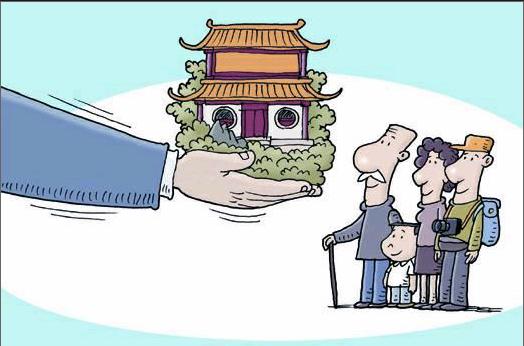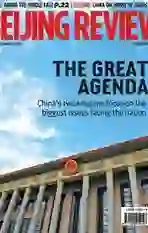SPENDING APPROPRIATELY
2014-03-18ByYinPumin
By+Yin+Pumin

For years, government expenditure on vehicles, receptions and overseas trips for officials—also known as the “three public-funded consumption categories”—has been a topic of contention among the Chinese public due to the large sums of money coupled with a lack of transparency.
At a work conference of the State Council, Chinas cabinet, on February 11, Premier Li Keqiang reiterated the Central Governments determination to solve the problems concerning the misuse of public funds. He required governments at all levels to produce detailed accounts of their expenses and to guarantee complete transparency.
“The misuse of public funds has long been accused of being a major source of corruption and waste. If left unchecked, the governments credibility will be undermined,” said Wu Zhongmin, a professor at the Party School of the Central Committee of the Communist Party of China (CPC).
Zhu Lijia, a public administration professor at the Chinese Academy of Governance, said that transparency is one of the major standards used to evaluate a governments credibility.“What matters most is that detailed accounts, listing each specific purchase or trip paid with taxpayers money, should be delivered to the public for their supervision,” he said.
Zhu also recommended that prior audits be conducted by an independent party to give more credibility to the official data released in government agencies financial accounts.
Downward trend
Just a month after their election, the new CPC leadership launched a campaign in December 2012 to promote frugality and cut out extravagance. Against this backdrop, publicly funded expenditure by officials has attracted greater attention from both the authorities and the public.
According to statistics released by 28 provincial-level governments in their work reports to local legislatures in January, excluding Hainan, Hunan and Anhui provinces, these regions budgets for the “three public-funded consumption categories” have been cut by 5 to 30 percent compared with that of last year.
On January 16, Li Qiang, Governor of east Chinas Zhejiang Province, pledged to cut local expenditure on government vehicles, receptions and officials overseas trips by 30 percent this year, the largest among all projected reductions. The money saved will be used to build water conservation projects, improve water quality and control water pollution, Li said.
The municipalities of Beijing and Shanghai, as well as Guangdong, Hubei and Shaanxi provinces, have slashed their budgets for the three categories by more than 10 percent.endprint
The Guangdong Provincial Government said that it planned to spend 56.41 million yuan($9.29 million) on officials overseas trips this year, down 25 percent from last year. Its budgets for government vehicles and receptions are expected to be reduced to 435 million yuan($71.6 million) and 258 million yuan ($42.47 million) respectively this year, a cut from 500 million yuan ($82.3 million) and 289 million yuan ($47.57 million) in 2013.
The government of northwest Chinas Shaanxi Province announced a 70-million-yuan($11.52 million) cut from the 2013 budget for the three categories, and said that all of the money saved will be used to tackle air pollution.
Some local governments have made concrete rules in order to standardize expenses on government vehicles, receptions and officialsoverseas trips.
For example, the Guangzhou Municipal Government in Guangdong requires that the annual expense on each government vehicle be limited to less than 37,000 yuan ($6,090).
However, observers say that the governments efforts to slash public expenses still fall short of public demand and they call for more details in reports on how government departments are using public funds.
In July last year, the State Council issued a circular, ordering that provincial governments make detailed spending of public funds starting from 2013, while 2015 was set as the deadline for city and county governments.
In a regulation issued on November 25 last year, the CPC Central Committee and the State Council urged government agencies to disclose information on the use of public funds, curb unnecessary expenses and practice frugality during official receptions and trips.
“The central authorities have realized the importance of keeping up with the publics growing awareness of transparency and are pushing for change, especially at a time when many government agencies are still treating public requests without care,” said Han Fuzheng, a Hebei-based lawyer.
He complained that currently theres no clear standard but only general categories that determine what should be disclosed. “Some departments even refuse to disclose under the premise of confidentiality, or give vague responses,” he noted. “We urgently need to set up a specific information disclosure system, and make clear rules on what punitive measures will be taken should officials violate the rules.”
Corruption on wheels
Official statistics show that vehicles make up the largest portion of expenditures on the “three public-funded consumption categories.”endprint
For example, Guangdong spent 864 million yuan ($142.21 million) on the three categories last year, of which 500 million yuan ($81.64 million) went toward vehicle purchases an maintenance.
d
“Reform concerning government vehicles should be regarded as the core method to further reduce officials expenditure that are covered by public funds,” said Ye Qing, Deputy Director of the Hubei Provincial Bureau of Statistics.
In December 2012, the central authorities issued rules aiming to cut excessive spending of public funds, with decreasing the misuse of government vehicles as one of the priorities.
However, the CPC Central Commission for Discipline Inspection (CCDI) circulated a notice in mid-November last year, citing 4,851 cases involving either the misuse of government cars for private purposes or the purchase of excessively luxurious cars. These two violations of the frugality guidelines accounted for one third of all that were recorded.
Plenty of government officials treat official cars as if they were personal property and use them to send their children to school, attend weddings and even go shopping or traveling in them.
It is also common for government departments to require subordinate enterprises or institutions to “temporarily transfer” vehicles whose prices go beyond their budgets to high- er-level departments.
Some officials have been caught shielding vehicle plates or driving under the influence while in government cars. Last August, four people were killed when Xu Jianping, a deputy head of the forestry bureau of Nanchang, capital of east Chinas Jiangxi Province, drove drunk in an official vehicle.
Car use also creates more opportunities for corruption, as some officials run up large bills on gasoline and “repairs” in order to receive reimbursements from the government, according to anti-graft experts.
In an effort to combat the trend, the government of Xinyu in Jiangxi decided last December that it would auction off 83 percent of the vehicles belonging to it. As a result, up to 15 million yuan ($2.45 million) in administrative costs is estimated to be saved each year.
Less stringent, but still effective, moves have also been implemented in other regions.
In Yongsheng County in Lijiang City, southwest Chinas Yunnan Province, government cars are clearly marked, allowing the public to easily identify them and report misuse. This practice is shared by the government of Sihong County in east Chinas Jiangsu Province.endprint
In Guangzhou, GPS technology and a user identification system were adopted two years ago to track misused government vehicles, a move which local supervisory authorities estimate helped save 40 million yuan ($6.58 million) in a year.
The 400 government vehicles in Qitai County, northwest Chinas Xinjiang Uygur Autonomous Region, are also monitored via GPS at all hours.
However, its still widely believed among the public that “corruption on wheels” cannot be eradicated unless the decades-old system of government vehicles is reformed.
According to a survey conducted recently by China Youth Daily, more than 71 percent of the respondents support the abolition of vehicles for officials.
The survey sampled 5,100 people, who blame lax enforcement of existing measures for vehicle-based corruption.
According to Ye, China may have more than 2 million government cars. “It is hard for discipline watchdogs to monitor the use of every car,” Ye said.
The ultimate goal of the reform is to abolish the system of government cars, except for a very few vehicles for special use, Ye added.endprint
